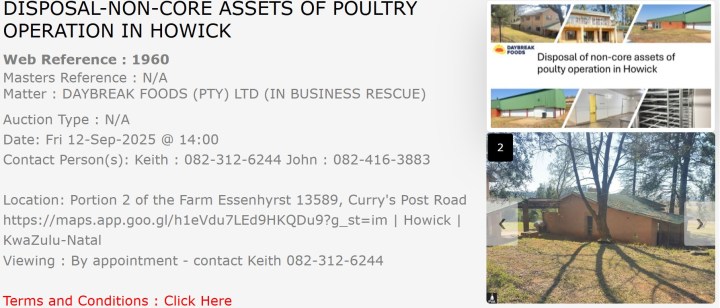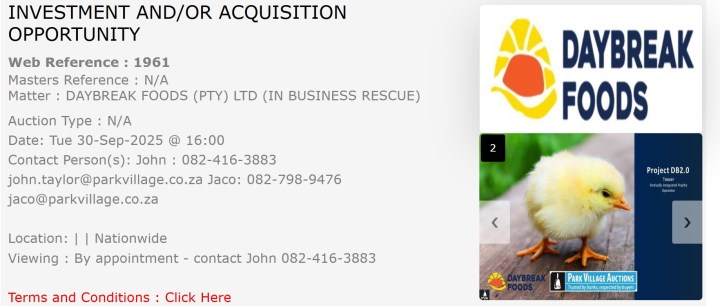
Daybreak Foods to chop 2,200 jobs in brutal business rescue plan
Daybreak Foods, the troubled poultry producer once hailed as a black empowerment success story, will be cutting jobs. The current proposed number of workers is more than 2,200, almost 80% of the workforce, who will be retrenched as the company’s business rescue practitioner (BRP) Tebogo Maoto executes a survival plan designed to keep the lights on and recover what little value remains for the company’s main funder, the Public Investment Corporation (PIC).
From its peak as a fully integrated poultry operation, Daybreak is now a shell of itself. Only about 500 employees are expected to remain to sustain its breeder farms and hatcheries, the backbone of an operation that currently produces about 800,000 chicks a week. For most workers at the Delmas and Sundra abattoirs, or in corporate offices, it’s the end of the line.
A company eating itself alive
The retrenchments were part of a lean operations strategy, Maoto said.
“We have to align the workforce with the company’s operational needs. As difficult as this is, the decision is about saving the business and preserving what jobs we can.”
The financial arithmetic tells the story: Daybreak generates about R20-million a month from limited operations, while its salary bill is nearly R33-million. Without drastic action, the company would bleed out before the business rescue plan even got to a vote.
“Daybreak cannot afford to carry people who are not rendering services,” Maoto told employees in a Tuesday, 2 September 2025 letter responding to union queries that was shared with Daily Maverick.
“The stipend provision was necessary to comply with the funding arrangement and at the same time provide some degree of financial support.”
‘We never agreed to this’
But employees say the stipend system — R1,500 for those earning less than R15,000, and 10% of salary for those earning above that — was forced on them without consultation.
“We never agreed to this. They just started paying stipends before the plan was even adopted,” one abattoir worker told Daily Maverick.
For many families, the stipend amounts to less than transport and food costs.
“It feels like we are being forced to work for free. How do you feed a family with R1,500 a month?” another worker asked.
The law of the land as stated in the Companies Act requires employee or union consent for any material changes to employment contracts during business rescue. Which means that if the business rescue practitioner is altering contracts without agreement, workers can approach the CCMA or the Labour Court.
Unions are already exploring their options. The South African Equity Workers’ Association (Saewa), which represents a portion of Daybreak staff, has warned that unilateral changes could trigger industrial action. Others are considering direct challenges to the business rescue practitioner’s decisions at the Companies Tribunal or high court.
Communication breakdown
Tensions have been simmering for months. When business rescue was first initiated earlier this year, workers staged an unprotected strike at the Merinovlakte and Diepputten hatchery facilities. Security incidents, including robbery and stock theft, have added to the sense of disorder on the farms.
Although Maoto insists labour relations have stabilised, the stipend controversy has reignited mistrust. In his letter to the employees’ committee, he stressed that a “bona fide attempt” had been made to reach consensus.
“We engaged in consultations and explained the financial and operational positions. Unfortunately, consensus could not be reached,” he wrote.
For workers, the consultations were little more than formalities.
“They told us what they were going to do. We never had a real choice,” one union representative said.
Retrenchments on hold
There is still a procedural hurdle before any retrenchments can be carried out. Under the Companies Act, the business rescue practitioner cannot begin Section 189 retrenchment consultations until the business rescue plan is formally adopted by the requisite majority of creditors.
That vote has not yet taken place. But few expect creditors, particularly the PIC, which is owed the most, to block the plan.
Once the plan is adopted, retrenchment consultations with the employees’ committee will begin. The timelines remain vague, though the business rescue practitioner has already outlined a division-by-division breakdown of job cuts. The Delmas and Sundra abattoirs alone account for nearly 1,900 retrenchments.
“We request that employees remain calm and patient during this difficult period,” Maoto pleaded in his letter. “We remain committed to rescuing the company and ensuring sustainable employment in line with operational needs.”
What this means for Daybreak Foods employees
- More than 2,200 jobs are expected to be cut once the business rescue plan is adopted. Until then, employees will continue receiving stipends instead of full salaries: R1,500 for those who earn under R15,000 per month, and 10% of salary for those who earn more.
- Pension fund arrears are being settled this week (by Friday, 5 September 2025), meaning employees will be able to access their retirement savings. If operations at the Sundra abattoir restart or a strategic equity partner is secured, some retrenched workers may be rehired, but nothing is guaranteed.
The PIC’s long shadow
Since 2015, the PIC has sunk about R1.44-billion into Daybreak through an initial R1.19-billion acquisition and a subsequent R250-million facility. Much of that has already been written off as “sunk cost”. A R150-million funding injection that allowed stipends to be paid was merely the latest attempt to avoid a total collapse.
For the PIC, liquidation would mean almost no return. That’s why Maoto insists a business rescue plan, no matter how harsh on staff, offers better outcomes.
“Concurrent creditors would receive negligible dividends under liquidation,” he said.
The plan to save Daybreak and recoup some of the PIC’s money hinges on three pillars: asset sales, strategic partnerships and monetising parts of the value chain.
What this means for the PIC and taxpayers
- The PIC has sunk at least R1.44-billion into Daybreak since 2015. Liquidation would probably yield negligible returns, which is why the PIC supports the business rescue process. Proceeds from asset sales, including a Howick property, and a potential equity partner are the main avenues to claw back value.
- Because the PIC manages funds on behalf of the Government Employee Pension Fund, UIF, and Compensation Fund, losses at Daybreak ultimately hit public servants’ pensions and unemployment insurance reserves. A failed rescue would deepen scrutiny of the PIC’s investment strategy and expose weaknesses in state-led empowerment projects.
First up is a Howick property already handed to Park Village Auctions. The proceeds will be funnelled back into the rescue process.

The Howick property up for auction via Park Village Auctions. Image: Park Village Auctions
Second, a request for proposals has been issued for a strategic equity partner (SEP) to inject fresh capital and operational expertise. Interested parties have until the end of September to express their interest, along with a R3-million deposit (refundable to unsuccessful bidders). Binding offers are expected in December, with final agreements targeted for mid-2026, subject to regulatory approval.
Third, the business rescue practitioner is exploring standalone revenue streams: selling day-old chicks, feed milling, live bird trading, cold storage and retail branding. Leasing out warehouse and cold storage facilities could generate fixed monthly income, though this has been deprioritised for now.

The auction ad for the business and its assets via Park Village Auctions. Image: Park Village Auctions
Analyst Anthony Clark of Smalltalkdaily Research wrote in an investment note: “It is my view that no listed poultry stock has any interest in acquiring Daybreak in its entirety. The managerial time needed to rehabilitate a totally broken farming and feed business aligned to the vast investment needed to rehabilitate a 1-million-plus bird per week operation would not be financially viable.”
However, Clarke thinks a breakup of various parts of the business would draw significant interest from any of the big four bird companies — Astral Foods, Rainbow Chickens, Country Bird Holdings and Sovereign Foods.
What’s at stake
For workers, the retrenchments are devastating, but some see a narrow path back. If the Sundra abattoir can be restarted, or if a strategic partner is secured, retrenched workers may be rehired.
“As operations ramp up, affected employees could be redeployed,” Maoto has said.
Still, most workers remain sceptical.
“We hear promises of jobs coming back, but nothing is guaranteed. Once you are retrenched, you are out,” one hatchery worker said.
The only consolation is that the business rescue practitioner has secured funding to clear arrears on pension fund contributions, with payments scheduled by Friday, 5 September. Once processed, employees will be able to liquidate their pensions.
For the workers, many who live in small towns around Mpumalanga, the retrenchments mean more than lost income. They mean uprooted families, collapsing local economies and broken promises of empowerment. DM
Contact us
31 Spanner Rd, Clayville Industrial, Olifantsfontein, 1666
Infodb@daybreak.co.za
012 641 0050
Report any incidents of fraud, theft, corruption or misconduct to our 24 hour Speak Up line 0800 204 428





%402x.svg)




